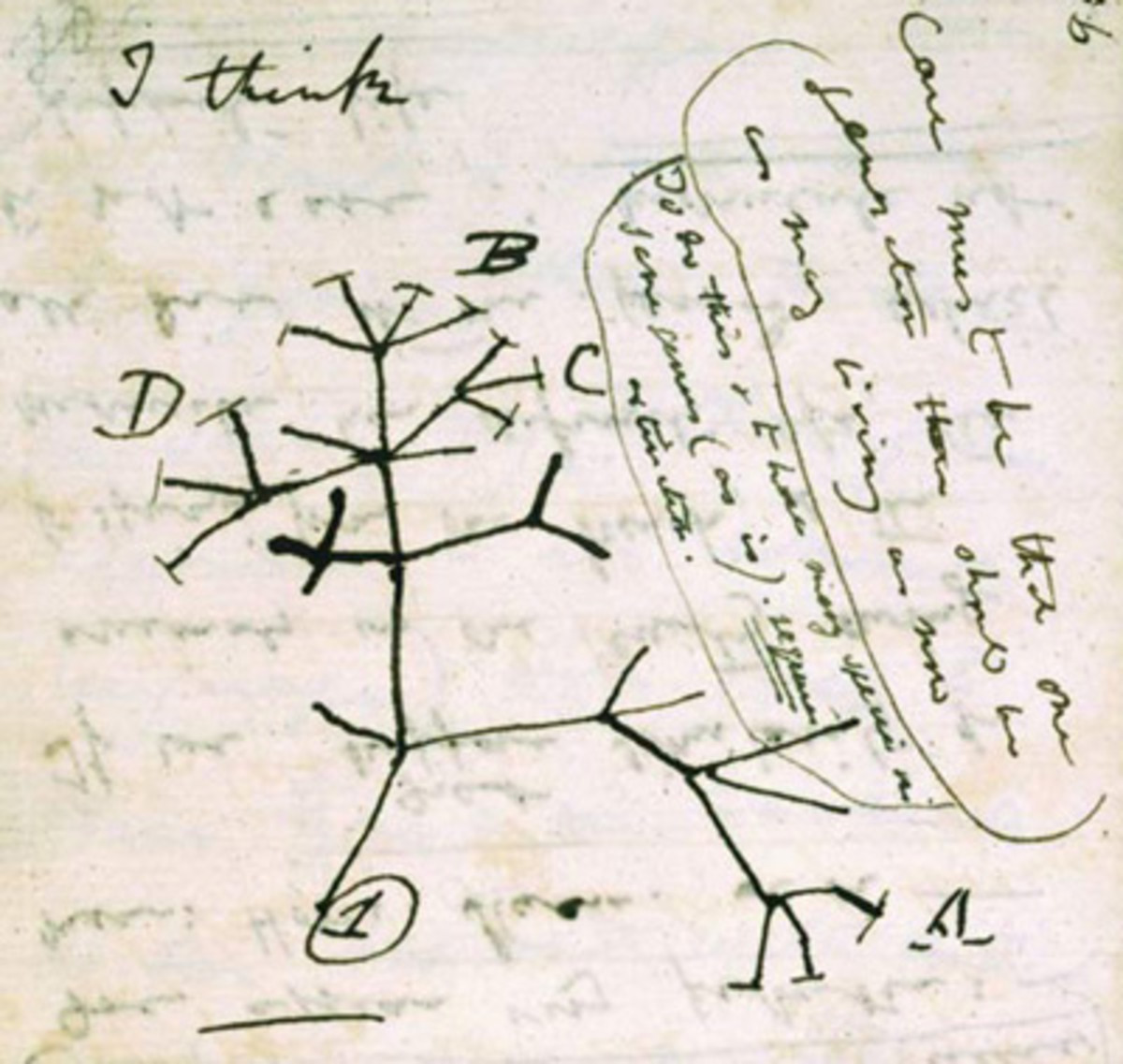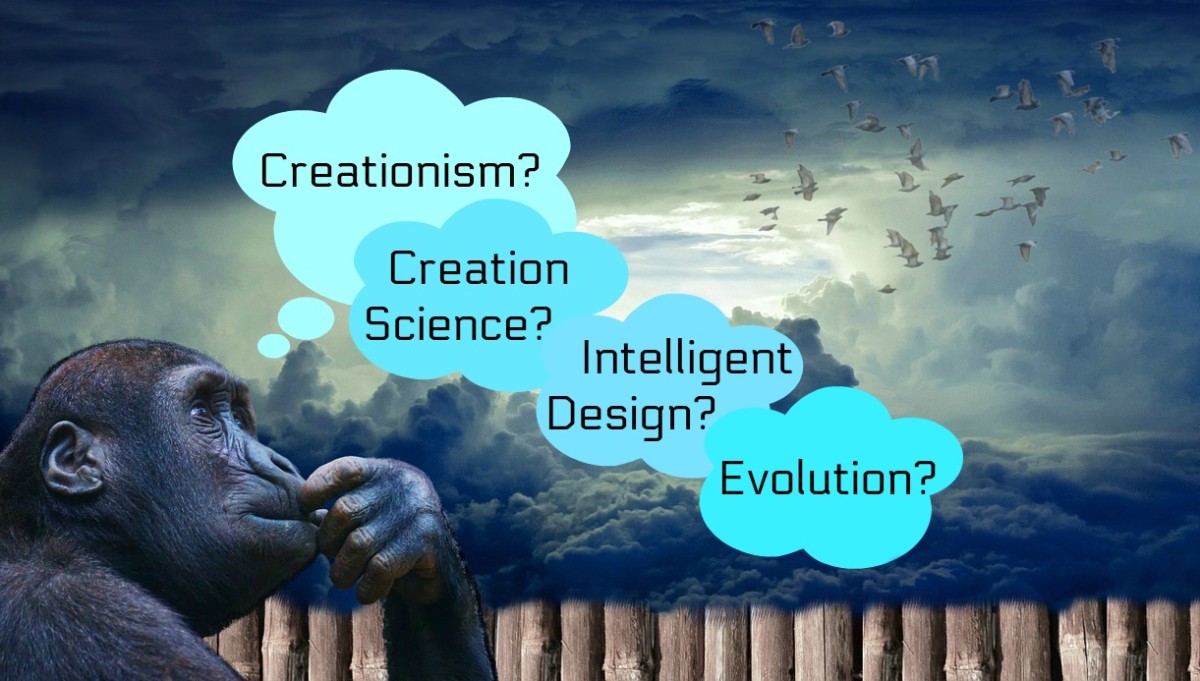Science and Religion

My impetus for writing this hub was the lengthy discussion that followed the posting, by one of our esteemed colleagues here on HubPages, of an article on Darwin and evolution. That article, which offers yet another creationist diatribe blaming contemporary evil and the downfall of America on the atheism begat by evolutionary thought, does a considerable disservice to Education and Science (the topic under which it is listed): like all the other creationist propoganda I have encountered, its arguments are nothing but misinformed hyperbole based on dubious premises and non sequitur conclusions. Since I am a big fan of Darwin, my initial reaction was to write a detailed rebuttal entitled “In defense of Darwin: a refutation of creationist arguments against macroevolution”; or better yet, “Creationist Nonsense”.
But after some introspection, I changed my mind. The change came when I asked myself: what good will come from me writing (yet another) rebuttal of creationism? Plenty have already been written, and by much better writers than me—luminaries like the late Stephen Jay Gould. Their eloquent refutations are readily accessible to anyone who is interested. Moreover, nowadays the vast majority of scientists agree that the facts of paleontology, anatomy, embryology and molecular genetics imply macroevolution—the shared ancestry of all animals (and indeed, barring the existence of a “shadow biosphere”, of all life on earth).
And yet, for the fundamentalist cult of creationism, the same facts are interpreted as being evidence for the literal truth of the biblical story of Genesis. How can that be? To me it makes no sense whatever—there is no more scientific evidence for the Hebrew creation myth than there is for the Greek gods, Celtic fairies, or Santa Claus (sorry kids—that doesn’t mean he isn’t real!).
Attributing the fossil record to Noah’s flood requires an implausible theory of sedimentary geology that geologists have roundly rejected, not because it contradicts their evolutionary worldview, but because it is scientifically untenable. Denying the existence of transitional fossils based on the fact that fossils of similar age or older have been discovered with more modern features only shows that the denier is unclear on the concept. And macroevolution is no more undermined by the fact that no one has seen it happen than physical chemistry is undermined by the fact that no one has seen an atom—indeed, most of what is commonly held to be factual knowledge in physics and chemistry is refractory to direct observation, but strangely unquestioned by creationists. And so on and so on. Creationist arguments have an Alice in Wonderland quality, requiring a willfully ignorant, convoluted conception of science that is fundamentally non-scientific. Biblical creationism is not science—it is non-science—and its pretensions to science produce utter nonsense.
But it does not really help the evolutionist’s cause to say this, as I recently learned. Creationists are well prepared for such attacks, and are to be commended for mounting a defense that effectively puts them on the offense. The emotional responses of impatient or frustrated evolutionists are taken as proof that their “belief” in evolution is no more scientific (and actually less so) than belief in Genesis: that it is based not on an objective interpretation of the evidence, but rather on a rigidly pre-conceived worldview. Unfortunately, this creationist ploy is as effective as it is ironic.
And as much as I hate to admit it, it pushed my buttons. It pissed me off—and like an obsessive who can’t stop picking at a festering sore, I kept going back for more. That of course is just what they want, because it fits their strategy of entrapment. Once you become emotional, they have you right where they want you—supporting their claim that evolution is entirely subjective, and hence not science at all. And I fell right into that spider’s web.
So I thought it behooved me to write a detailed and entirely dispassionate rebuttal of all the creationist claims of “scientific” support for the biblical account of Genesis. That would settle it, once and for all...
Wouldn't it?
Well no, of course it wouldn’t. But perhaps it would be enough to sway someone sitting on the fence, confused by all the contradictory rhetoric; or better yet, help young impressionable minds get past the obfuscation and see creationist sophistry for what it is.
But the more I thought about it, the more it became clear that that is not what was bothering me at all. Yes, a staggeringly high percentage of the populace still believes in the literal truth of Genesis. And these folks are politically organized, doing their damndest to get their religious cult admitted into public schools. Nevertheless, I am not losing any sleep over it, and can rest assured that real science—science that uses facts not to reify an ancient, out-of-context cultural mythology, but to construct imaginative theories (as Darwin did) that explain our current existence—will prevail. The reason is that science adapts to change. Like organisms, ideas evolve, and the fittest survive. In the realm of ideas, the fittest are those that best fit the facts and most simply explain experience. And experience is ever-changing and far from certain. Being inherently skeptical, science admits uncertainty, and is thus more realistic and more adaptively flexible than religious dogma. The scientifically constructed idea of evolution is widely accepted as fact, at least by those who have not been brainwashed by religion; and that acceptance will only increase as science itself continues to evolve.
So why do the creationist attacks set me off? Is it possible that they hit home because deep down I know they are actually right, correct in their claim that the evolutionary worldview is just another religion?
Well, maybe. It is true that science is one thing, and religion is something else. But science was actually born in the service of religion, and like religion, it is still used to support rigid worldviews. Julian Jaynes hit the nail on the head in the last chapter of his book The Origin of Consciousness in the Breakdown of the Bicameral Mind—a work, in my opinion, that is just as important and monumental as Darwin’s Origin of Species. According to Jaynes (First edition, p. 434):
"We sometimes think, and even like to think, that the two greatest exertions that have influenced mankind, religion and science, have always been historical enemies, intriguing us in opposite directions. But this effort at special identity is loudly false. It is not religion but the church and science that were hostile to each other. And it was rivalry, not contravention. Both were religious. They were two giants fuming at each other over the same ground. Both proclaimed to be the only way to divine revelation.
“It was a competition that first came into absolute focus with the late Renaissance, particularly in the imprisonment of Galileo in 1633. The stated and superficial reason was that his publications had not been first stamped with papal approval. But the true argument, I am sure, was no such trivial surface event. For the writings in question were simply the Copernican heliocentric theory of the solar system which had been published a century earlier by a churchman without any fuss whatever. The real division was more profound and can, I think, only be understood as a part of the urgency behind mankind’s yearning for divine certainties. The real chasm was between the political authority of the church and the individual authority of experience. And the real question was whether we are to find our lost authorization through an apostolic succession from ancient prophets who heard divine voices, or through searching the heavens of our own experience right now in the objective world without any priestly intercession. As we all know, the latter became Protestantism and, in its rationalist aspect, what we have come to call the Scientific Revolution.
“If we would understand the Scientific Revolution correctly, we should always remember that its most powerful impetus was the unremitting search for hidden divinity. As such, it is a direct descendant of the breakdown of the bicameral mind. In the late seventeenth century, to choose an obvious example, it is three English Protestants, all amateur theologians and fervently devout, who build the foundations for physics, psychology, and biology: the paranoiac Isaac Newton writing down God’s speech in the great universal laws of celestial gravitation; the gaunt and literal John Locke knowing his Most Knowing Being in the riches of knowing experience; and the peripatetic John Ray, an unkempt ecclesiastic out of a pulpit, joyfully limning the Word of his Creator in the perfection of the design of animal and plant life. Without this religious motivation, science would have been mere technology, limping along on economic necessity.”
Jaynes concludes (p. 436):
“This drama, this immense scenario in which humanity has been performing on this planet over the last 4000 years, is clear when we take the large view of the central intellectual tendency of world history. In the second millennium B.C., we stopped hearing the voices of gods. In the first millennium B.C., those of us who still heard the voices, our oracles and prophets, they too died away. In the first millennium A.D., it is their sayings and hearings preserved in sacred texts through which we obeyed our lost divinities. And in the second millennium A.D., these writings lose their authority. The Scientific Revolution turns us away from the older sayings to discover the lost authorization in Nature. What we have been through in these last four millennia is the slow inexorable profaning of our species. And in the last part of the second millennium A.D., that process is apparently becoming complete. It is the Great Human Irony of our noblest and greatest endeavor on this planet that in the quest for authorization, in our reading of the language of God in Nature, we should read there so clearly that we have been so mistaken.”
And yet, Jaynes goes on to argue, science breeds monistic worldviews: Materialism, Marxism, Environmentalism, and even Evolutionism (pp. 441-443):
“These scientisms, as I shall call them, are clusters of scientific ideas which come together and almost surprise themselves into creeds of belief, scientific mythologies which fill the very felt void left by the divorce of science and religion in our time. They differ from classical science and its common debates in the way they evoke the same response as did the religions which they seek to supplant. And they share with religions many of their most obvious characteristics: a rational splendor that explains everything, a charismatic leader or succession of leaders who are highly visible and beyond criticism, a series of canonical texts which are somehow outside the usual arena of scientific criticism, certain gestures of idea and rituals of interpretation, and a requirement of total commitment. In return the adherent receives what the religions had once given him more universally: a world view, a hierarchy of importances, and an auguring place where he may find out what to do and think, in short, a total explanation of man. And this totality is obtained not by actually explaining everything, but by an encasement of its activity, a severe and absolute restriction of attention, such that everything that is not explained is not in view....
“Applied to the world as representative of all the world, facts become superstitions....
“Science then, for all its pomp of factness, is not unlike some of the more easily disparaged outbreaks of pseudoreligions. In this period of transition from its religious basis, science often shares with the celestial maps of astrology, or a hundred other irrationalisms, the same nostalgia for the Final Answer, the One Truth, the Single Cause. In the frustrations and sweat of laboratories, it feels the same temptations to swarm into sects, even as did the Khabiru [i.e. Hebrew] refugees, and set out here and there through the dry Sinais of parched fact for some rich and brave significance flowing with truth and exaltation. And all of this, my metaphor and all, is a part of this transitional period after the breakdown of the bicameral mind.”
I hate to say it—and I know many of my scientific colleagues will hate to hear it—but I think Jaynes is correct. Science is one thing, but belief in the literal truth of one's metaphors is something else. It is one thing to accept that humans are a species of animal; it is something else to think that that fact adequately explains humanity. It is one thing to accept that organisms make use of biochemical mechanisms to develop and maintain physiological homeostasis; it is something else to think that organisms are themselves machines. As conscious beings, we put metaphors to good use. But we tend to forget that they are just metaphors.
So in conclusion, I no longer feel any need to defend evolutionary science: it can and will defend itself just fine. And with the efforts of brilliant and imaginative thinkers like Darwin, it will continue to thrive and “boldly go where no one has gone before”. Instead, I wish to thank my erstwhile adversaries in the creationist camp for reminding me of the importance of humility, and of embracing uncertainty. It’s not healthy to get too attached to one’s beliefs: that is a one-way ticket to terminal stagnation, which in life means death. But as long as we keep an open mind and pay attention, nature will keep rewarding us with wonderful surprises that help us grow: for it will always be the case that “There are more things in heaven and earth, Horatio, than are dreamt of in your philosophy.” (Hamlet, Act I, Scene 5).








